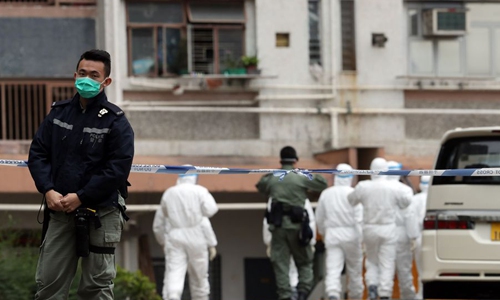HOME >> CHINA
National security law drive launched in HK
By Yang Sheng Source:Global Times Published: 2020/2/24 21:48:40 Last Updated: 2020/2/25 2:31:22

A police officer works near the Hong Mei House, Cheung Hong Estate of Tsing Yi area in south China's Hong Kong, Feb. 11, 2020. (Xinhua/Li Gang)
An online signature drive to push for national security legislation - passing Article 23 of the Basic Law - in the Hong Kong Special Administrative Region (HKSAR) began on Sunday, with the initiator saying there is an urgent need for the city to pass the law because separatists and anti-government forces are using the epidemic to harm the security of the country, the stability of the city, and public health.Hong Kong pro-establishment lawmaker Junius Ho Kwan-yiu, the initiator of the signature drive, told the Global Times on Monday that "the virus and the separatism of Hong Kong are threatening the HKSAR. If we still allow the anti-government and separatist forces to harm the city like last year and let them take further control of the Legislative Council after the election scheduled in September, that would be too late."
According to data provided by the Hong Kong-based NGO Politihk Social Strategic, the organizer of the signature drive, 157,332 people have signed online in support of national security legislation in Hong Kong as of press time.
Tang Tak Shing, chairman of Politihk Social Strategic, told the Global Times on Monday that the signature drive had faced some problems, as they previously chose to work with a US company to initiate the drive, but due to interruptions from anti-government forces, the US company closed the previous account on Saturday.
"But fortunately, we downloaded and saved the previous data, which had more than 100,000 signatures," he said.
On Sunday, the NGO restarted the signature campaign with the help of Tencent, a Chinese internet company, Tang noted.
Ho said after the COVID-19 outbreak, medical workers should try their best to safeguard public health. But unfortunately and ironically, opposition politicians and separatists are still urging medical workers to go on strike, and this is seriously threatening the health of the Hong Kong people, and also a threat to public health security, a crucial part of national security.
If Article 23 is passed, the HKSAR government would be authorized to immediately crack down on acts linked to foreign hostile forces' interference that could seriously harm public health and national security in Hong Kong, Ho noted.
"We have experienced so many horrible incidents in the past few years. From the Occupy Central 2014 to the months-long turmoil starting from 2019 to the present, and now the epidemic. There is no reason and excuse for us to wait anymore," he noted.
In 2003, the national security law, or Article 23 of the Basic Law, failed to pass due to complex public opinion, and also partly due to the fact a few lawmakers surprisingly changed their stance in voting.
Ho believes only foreign forces, the traitors of China, the sympathizers of the anti-government forces, and the people who believe in an appeasement policy will oppose the legislation.
At this stage, the purpose of the signature drive is to shape and form a foundation of public opinion to push forward the national security legislation again, Ho said.
"The legislation is the responsibility of the HKSAR government, and the reason why the government is reluctant to push the legislation is that it's worried about public opinion. So what we are doing now is to provide them a solid evidence of public opinion and we will urge the government to bravely push the legislation after the signature drive is concluded," he noted.
Posted in: HK/MACAO/TAIWAN